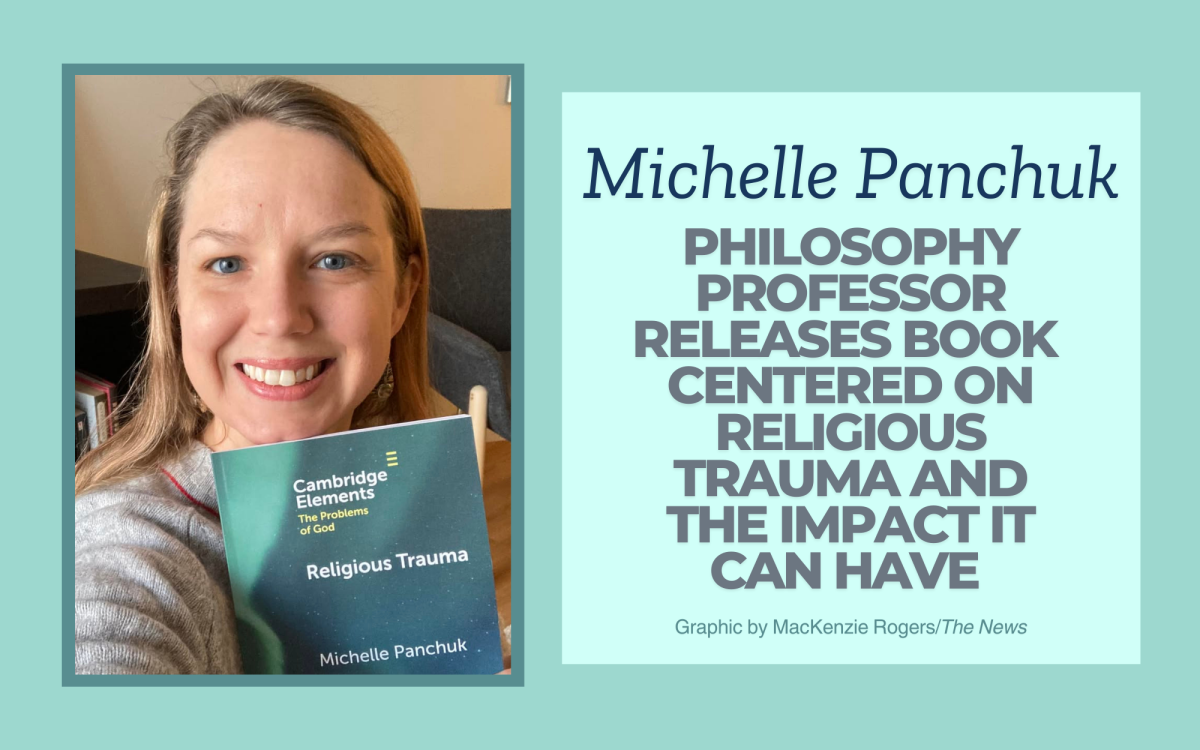As 2024 came to a close, the Cambridge University Press published a philosophy of religion book by one of Murray State’s most community-focused faculty members.
Michelle Panchuk, professor of philosophy, wrote “Religious Trauma” for the Cambridge Elements: the Problems of God series in December. This 75-page academic book, Panchuk’s longest single-author work, examines negative experiences with religion, the impacts it can have and how religious institutions prevent the perpetuation of trauma.
Panchuk’s research in the philosophy of religion spans back to her education at Columbia International University in Columbia, South Carolina. She said philosophy allowed her to engage with big questions about life without assuming she knew the right answer, something she felt she had not experienced while growing up in a fundamentalist environment.
After attending graduate school at the University of South Carolina, Panchuk began working on the concept of religious trauma during a postdoctoral position at the University of Notre Dame in Notre Dame, Indiana.
Panchuk described religious trauma as any experience with a long-term negative impact on one’s ability to engage with religion and spirituality. She said an important part of her work is making a platform for personal accounts of religious trauma because all people, whether they engage with religion or leave it behind, having the ability to make their own informed decisions about their spirituality is a “fundamental human good.”
“As I began to research religious trauma, I realized philosophy of religion… didn’t have a lot to say about trauma, lived experience or the significance of race, gender and disability in the way that we experience religion,” Panchuk said. “In analytic philosophy of religion, it has been mostly practiced by religious practitioners. I don’t think that is necessarily bad, but the result has been an overemphasis on positive aspects of religion… and not a lot of attention to lived experience and what it’s like to be a religious or spiritual person.”
Michael Peterson, editor of Cambridge Elements: The Problems of God, asked Panchuk to write a book on her religious trauma research for publication. She said she finished writing the book around December of 2023 and the lengthy editing process was prolonged by a cybersecurity breach at the Cambridge University Press. Some two and a half years after Peterson reached out to her, “Religious Trauma” was finalized and published.
Panchuk’s colleague Andrew Black, professor of English, sent a mass email to the English and philosophy department announcing the publication and sharing a temporarily free downloadable PDF version of “Religious Trauma.”
“If you’ve ever had Dr. Panchuk’s classes or attended her lectures, you’ll know that she is one of the premier experts in the field on this topic, which she is helping scholars to rethink,” Black said. “I look forward to reading the entire text, and hope it will be publicized throughout the university community as an example of the excellent work this department does.”
Several faculty members sent their congratulations to Panchuk in reply to Black’s email including Julie Cyzewski, professor of English, who said the development of “Religious Trauma” has been the subject of many conversations between them.
“(Her research) is something that she cares very passionately about,” Cyzewski said. “It comes up in the way in which she thinks about the world, and the news, and her communities here in Murray. I don’t know how she does everything she does… She really connects her academic work to other aspects of her life and work.”
Besides teaching and research, Panchuk is heavily involved in communities inside and outside of Murray State. Some of her activities include serving as the president of the Murray State Gender Equity Caucus, running a 5k fundraiser in June 2024, helping students in the Pride Center faculty office hours and guest lecturing on Antigone for one of Black’s classes.
Sydney Littrel, junior Teaching English to Speakers of Other Languages and Spanish education, knows Panchuk as the faculty advisor to the Episcopal Campus Ministry (ECM). Sponsored by St. John’s Episcopal Church, ECM promotes a non-discriminatory and LGBTQ+ affirming religious community where Murray State students can explore their relationships with Christianity.
Littrel is the ECM vice president and vestry representative. She said Panchuk’s work brings a thoughtful awareness of any potential systemic issues to her service on the St. John’s vestry.
“Since August 2023, (Panchuk) has become pretty involved because we don’t currently have a campus minister, so she’s really stepped up and filled in there,” Littrel said. “She knows how to make time for herself and people she cares about, but she also serves in so many capacities and does all this incredible academic stuff.”
Panchuk is on temporary leave from Murray State to complete a psychology cross-training grant at the Center for Theological Inquiry in Princeton, New Jersey. The interdisciplinary nature of the grant allows her to pursue her current research on what it means to flourish in a personal religious or spiritual sense.
“If we have a sense of what it means to thrive spiritually, how does religious trauma undermine that for all sorts of folks?” she said. “What sorts of practices or institutional dynamics and structures would promote a sort of flourishing for folks living in the aftermath of trauma?”
Panchuk will return to full-time teaching in the fall. She said she aims to move forward with her writing, combining “Religious Trauma” and her research in Princeton into a proposal for a full-length monograph, and to collaborate with Jana Hackathorn, chair of the Murray State psychology department, to conduct a study for “empirical evidence of the relationship between religiously traumatic experiences and spiritual struggles, post-traumatic stress disorder and impact on spiritual well being.”
Panchuk said she had one important note for anyone reading “Religious Trauma” and her other works on the philosophy of religion.
“I always feel obligated to say I’m not a mental health practitioner,” she said. “If someone recognizes themself in the description of religious trauma and feels like they need help working through that, I would recommend reaching out to resources on campus or elsewhere. Trauma is difficult to sort through on your own.”





























































































